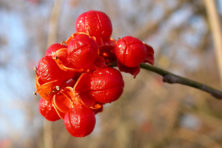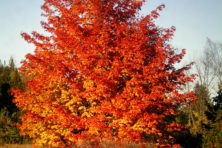‘Bittersweet’ Message about Colorful Autumn Arrangements
- Share
- Tweet
- Pin
- Share
Homeowners and decorators creating their autumn displays should avoid two invasive plants that have been used historically in Thanksgiving and other floral arrangements but are increasingly recognized as harmful to forests, wetlands, prairies and other wild areas.
Oriental bittersweet and multiflora rose offer attractive red accents but their use in holiday decorations and their disposal in compost piles increases the risk that these invasive plants will spread to new sites, says Matt Wallrath, Wisconsin Department of Natural Resources outreach coordinator working with the plant nursery, aquarium, pet, and bait industries to prevent the sale and distribution of invasive species.
“Our wild lands and conservation areas are threatened by these non-native plant species, which can outcompete native plants and displace native wildlife,” Wallrath said. “Vendors and consumers should seek native plant alternatives instead and avoid these invasive plants, which are illegal to sell or distribute in Wisconsin.”
Kelly Kearns, an invasive plant specialist for the DNR Natural Heritage Conservation Program, suggests that vendors, decorators, and others looking for bright accents should consider using Wisconsin native species including American bittersweet (Celastrus scandens), winterberry (Ilex verticillata), and native roses like smooth rose (Rosa blanda). “Native alternatives can add vivid color without posing a threat to our Wisconsin plants and animals,” Kearns says.
Search the DNR website, dnr.wi.gov, for “invasive species rule” to find an interactive list of invasive species, with factsheets, photos, identification tips and more.


